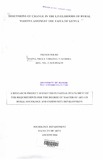| dc.description.abstract | This study examined the livelihoods of rural widows in a contemporary rural African
society, specifically the Taita. The objectives of this survey were to investigate
economic and social changes in women when they become widows in the rural Taita
communities, mechanisms that the widows adopt to cope with these changes in their
livelihoods and opportunities available for widows to improve their livelihoods
The survey [or the study W;IS undertaken in (he month of February 2004 and utilized
semi-structured interviews, key informant interviews and focus group discussions to
study the changes in the lives of rural women upon the death of their husbands. It
investigated the changes in income, social, productive and reproductive roles,
property ownership and participation in social groups and financial institutions. It
also highlighted coping mechanisms and identified opportunities that can be used to
improve the overall life of widows.
This research has shown that widowhood is a period of adversity for most women.
Their strategic positions in society are lowered and this reduces their bargaining
power to sustain basic livelihoods. Household incomes drop while some opt to
supplement productive activities. Reproductive roles are greatly increased am! social
integration is less for widows. Widows are hindered by financial contribution: in
joining self-help groups. Assistance from their families is not assured as the
economic growth is all the decline. Additionally, the informality of community
support structures has ensured that they have broken down leaving the widow
vulnerable to harsh alternatives such as exchanging sexual favours for assistance,
selling illicit brew and drugs, borrowing on credit and back breaking work such as
cutting of sisal trees. This study has shown that remarriage is not an option for many
widows as any property left by the husbands is governed by patriarchal customary
laws on inheritance. Government support is largely in the form of education bursaries
and food relief which benefit the widows incidentally.
The majority of widows voted in the last general elections and they should therefore
bargain for more support fr0111(heir constituency representatives. The desk study
reveals that new draft constitution shows progress in guaranteeing women's property
and inheritance rights. The civil society is also engaged in providing paralegal
training and raising awareness of local administrators. However, a lot more remains to
be done for the direct benefit of widows. Opportunities for widows lie mainly in their
organizing themselves for change and in engaging in trade and income generation
activities.
Key recommendations emerging from this survey include the paramount recognition
that widows are a special social group that represents pockets of poverty within the
nation. Special programs should be developed For widows particularly on poverty
alleviation and ensuring adequate housing for widows. Legal and institutional reforms
particularly in policies legislation and structures that prevent widows' enjoyment of
their property and inheritance rights must be made.
In addition mechanisms should be developed whereby tourism revenues from the
Tsavo National Park are shared with local communities. Increased NGO presence
and activities in Mwatate Division would greatly assist in providing or lobbying for
basic services as we as in provision of paralegal training and legal aid services to the
community and public administration officials. Counseling and advisory services for
widows were cited as a major need and these could be provided by faith based
institutions or NGOs. Lastly community awareness on the needs of widows would
greatly provide entry points for greater social integration of widows within the
community. | en |


